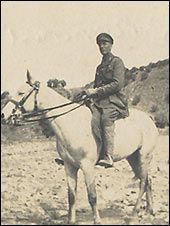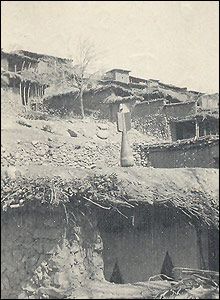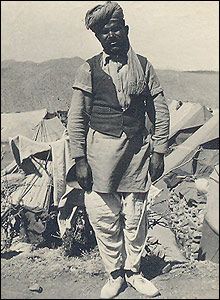MAVERICK
Member
Waziristan 1919
Why Britons walked warily in Waziristan
 'Waziristan is a thoroughly dangerous area'
'Waziristan is a thoroughly dangerous area'
In 1919, a young British army officer, Francis Stockdale, was deployed to the Waziristan area of British India.
The title of his book, "Walk Warily in Waziristan" seems no less appropriate now than it did 90 years ago .
It wasn't until the 1980s that Capt Stockdale's family published a handful of copies of the book, only a few of which survive. But because or renewed interest in the region, the family in the English county of Norfolk are considering reprinting it.
'Wait, watch and pounce'
The book provides a fascinating account of what was regarded then - as it is today - as a thoroughly dangerous area.
One of the main towns close to Waziristan is Tank. Capt Stockdale describes it as being "the worst station in British India".
"It was known as 'Hell's door knocker' because in the summer the temperature would rise so high that a village nearby rejoiced in the highest temperature in the world - a modest 131 degrees in the shade. "But it was also an area where hostile tribesman waited, watched and pounced," he wrote.
Ninety years ago, it seemed that British troops in Waziristan faced the same kind of dangers as Pakistani troops in the region do today.

The Waziristan area 90 years ago was awash with weapons, bombs and munitions. This bomb - which failed to go off - is originally believed to have been dropped by the British Royal Flying Corps.

Capt Stockdale and his bearer, Alla Bux (pictured), survived several skirmishes with tribals in the Waziristan area. British and India troops also had to contend with intense heat and outbreaks of diseases.

Capt Stockdale's cook in camp. British encampments were often surrounded by tribesmen who were not renowned for taking prisoners alive. The mountains made it hard to defend the camps.

British troops marvelled at the toughness of their enemies who seemed to be able to survive indefinitely in the most arid of conditions. Then as now peace negotiations were commonplace.

When not being attacked while attempting to expand the Raj, British troops like Capt Stockdale tried to improve the infrastructure of what remains one of the most inhospitable and remote areas of the world.
Why Britons walked warily in Waziristan

In 1919, a young British army officer, Francis Stockdale, was deployed to the Waziristan area of British India.
The title of his book, "Walk Warily in Waziristan" seems no less appropriate now than it did 90 years ago .
It wasn't until the 1980s that Capt Stockdale's family published a handful of copies of the book, only a few of which survive. But because or renewed interest in the region, the family in the English county of Norfolk are considering reprinting it.
'Wait, watch and pounce'
The book provides a fascinating account of what was regarded then - as it is today - as a thoroughly dangerous area.
One of the main towns close to Waziristan is Tank. Capt Stockdale describes it as being "the worst station in British India".
"It was known as 'Hell's door knocker' because in the summer the temperature would rise so high that a village nearby rejoiced in the highest temperature in the world - a modest 131 degrees in the shade. "But it was also an area where hostile tribesman waited, watched and pounced," he wrote.
Ninety years ago, it seemed that British troops in Waziristan faced the same kind of dangers as Pakistani troops in the region do today.

The Waziristan area 90 years ago was awash with weapons, bombs and munitions. This bomb - which failed to go off - is originally believed to have been dropped by the British Royal Flying Corps.

Capt Stockdale and his bearer, Alla Bux (pictured), survived several skirmishes with tribals in the Waziristan area. British and India troops also had to contend with intense heat and outbreaks of diseases.

Capt Stockdale's cook in camp. British encampments were often surrounded by tribesmen who were not renowned for taking prisoners alive. The mountains made it hard to defend the camps.

British troops marvelled at the toughness of their enemies who seemed to be able to survive indefinitely in the most arid of conditions. Then as now peace negotiations were commonplace.

When not being attacked while attempting to expand the Raj, British troops like Capt Stockdale tried to improve the infrastructure of what remains one of the most inhospitable and remote areas of the world.


 no matter how clever you are
no matter how clever you are 